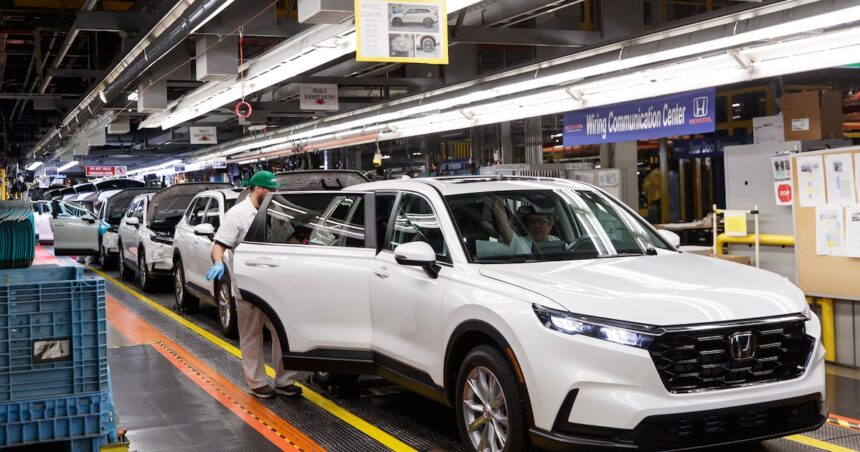As I drove through Alliston last week, the sprawling Honda plant that has been a fixture of this community for decades loomed large on the horizon. It’s a familiar sight for anyone who regularly travels Highway 89, but lately it represents something more – a flashpoint in Ontario’s electric vehicle ambitions.
Premier Doug Ford didn’t mince words when addressing Honda’s recent announcement to delay its planned $1.5 billion investment in Ontario’s electric vehicle manufacturing capacity. “We’re going to hold their feet to the fire,” Ford declared during a press conference in Mississauga, his tone conveying clear frustration with the Japanese automaker’s decision.
The investment delay represents a significant setback for Ontario’s automotive sector, which has been positioning itself as a future hub for electric vehicle production in North America. Honda had initially committed to retooling its Alliston plant to produce fully electric vehicles starting in 2028, creating a cornerstone in the province’s green manufacturing strategy.
“When companies make commitments to the people of Ontario, we expect them to follow through,” Ford said. “We’ve created the conditions for success – competitive electricity rates, skilled workforce, government support – and we need our partners to deliver on their promises.”
According to Jean Marc Leclerc, President and CEO of Honda Canada, the decision stems from “evolving market conditions” rather than any issues with Ontario’s business environment. “Consumer adoption of EVs is happening more gradually than anticipated,” Leclerc explained in a statement. “We’re adjusting our timeline to ensure alignment with actual market demand.”
The Ontario government has invested heavily in attracting EV manufacturers, with nearly $30 billion in commitments secured over the past several years, including major projects from Volkswagen, Stellantis, and battery manufacturers. This strategy has been central to Ford’s economic vision for the province.
Speaking with local auto parts suppliers in Brampton yesterday, I found mixed reactions to Honda’s announcement. “This creates uncertainty throughout the supply chain,” said Marissa Chen, operations director at AutomotiveTech Solutions. “We’ve been investing in retooling for EV component production based on commitments from manufacturers like Honda.”
The delay comes at a time when EV sales have shown signs of cooling across North America. According to Statistics Canada, while EV registrations continue to grow, the pace has slowed in recent quarters. The Ontario government’s ambitious target of 30% of new vehicle sales being electric by 2030 now faces additional challenges.
Industry analyst Jordan Williams from the Automotive Policy Research Centre suggests this may reflect a broader recalibration in the sector. “We’re seeing automakers globally reassessing their EV timelines as they navigate the reality of consumer adoption rates, charging infrastructure development, and the economic pressures of this transition.”
For Alliston, a community of just over 20,000 people where Honda employs approximately 4,200 workers, the delay creates economic uncertainty. Local businesses, from restaurants to housing developers, have been planning around Honda’s expansion plans.
Town councillor Maria Rodriguez expressed community concerns: “Honda has been our economic anchor for generations. While we understand business decisions need to adjust to market conditions, these delays have real impacts on local families and businesses.”
Premier Ford’s warning to automakers reflects the political stakes involved. With billions in public funds committed to supporting the industry’s transition, government officials are increasingly demanding accountability from manufacturers.
“The taxpayers of Ontario have stepped up with significant incentives and support,” Ford emphasized. “We need to see follow-through on these investments – jobs created, facilities built, and products delivered.”
The situation highlights the complex challenges in transitioning from traditional auto manufacturing to electric vehicle production. Building a robust EV ecosystem requires coordination between manufacturers, suppliers, infrastructure developers, and government policy.
Minister of Economic Development Vic Fedeli reinforced the government’s commitment to the EV strategy despite this setback. “Ontario remains positioned to be a global leader in EV production,” Fedeli stated. “We continue to work with Honda and all our auto sector partners to ensure these investments move forward.”







